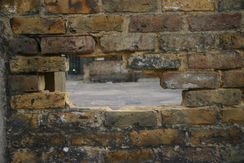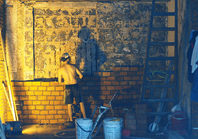 Mark, a fourth grade boy with autism sits in his special education classroom. The para-professional sits with him as they recite the names of the planets in order. Learning this information is required for one of his social-studies goals. His his goal states that he has to accurately list the planets in 8 out of 10 trials. It is built off of the fourth grade educational standard for his state requiring that all fourth graders have a working knowledge of celestial bodies, the universe, and galaxies. Right now, Mark can list them 6 out of 10 times. Is this a IEP bad goal? Not necessarily, but I pose this question. Does Mark know what a planet is? Can he describe the Earth as a "big ball" or a sphere? Isn't Mark just learning a list of random names? A major focus in public special education currently is to build educational goals off of grade level standards. While this is an excellent notion, it often leaves students with unusable splinter skills.  Learning can be compared to a wall. Each mastered skill can be equated with a brick firmly laid in the wall. Each brick supports the brick above it. When we expect kids to "lay bricks" when there is no supporting brick underneath, their wall will have gaps. If the gaps are too big, more advanced learning simply can't happen as you cannot lay a brick without any support. In order for solid learning to take place, lower-level skills must be mastered, laying a foundation for more advanced skills. . In daily life, we rarely question mastery. We have mastered knowing our address when we can recite it automatically upon request. We have mastered riding a bicycle or driving when it becomes an automatic skill. Mastery of academics can be just as clear. We know we have mastered our multiplication facts when it takes very little effort to recall a fact. We know we have mastered reading at a certain grade level when we recognize all of the words on that level easily by sight. When we teach kids concepts, while skipping prerequisite less-advanced concepts, we do them a disservice. The result can be a graduating senior who has some advanced algebra skills, but still can't count coins, or a middle school student who can read on a high school level, but can't understand what they read because their vocabulary is on a third grade level. "I would rather have a daughter graduating with a solid seventh grade education" a father said to me once, "than have a daughter with a solid second grade education who had some high-school skills".  Building a solid educational wall can be a challenge for kids with learning disabilities or developmental delay. Some skills don't come easy and sometimes it is easier to just "move on". It is important during these times to look and see if a lower-level skill needs to be mastered first, laying the foundation that will help the more difficult concept to come more easily. For example. If a student is having trouble sequencing the events in a story, perhaps this is because they don't have a firm grasp on the concepts of before, after, first, second, third etc. Mastery-based teaching, building a solid educational wall, helps students to have more long-term success gives them a solid foundation for life-long learning!
1 Comment
|
PurposeTo provide useful information to families regarding educational strategies, interventions, and tools. ArchivesCategories
All
|
 RSS Feed
RSS Feed